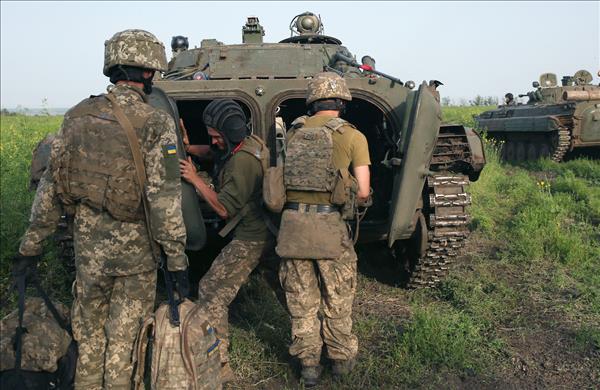
US foreign policy elites playing blame game over Ukraine
For US foreign-policy elites, the Ukraine crisis is about far more than the threat Russian President Vladimir Putin poses to the neighboring country; rather, it is in large part an exercise in reputation preservation.
For the past several months members-in-good-standing of the foreign-policy“blob” have been busy circling the wagons in an attempt to deflect blame for a crisis they themselves helped to bring about.
Three decades on, we are harvesting the poisoned fruits of America's intervention in the post-Soviet space. As is by now well known, the crusade to turn former Soviet republics into American satellites began under president Bill Clinton.
Clinton's top Russia aide and, later, deputy secretary of state, Strobe Talbott, has written that one of his“jobs was to deliver to leaders of all the new independent states messages of American support for their sovereignty and willingness to help them resolve their disputes with each other and with Moscow.”
Accompanied by“a team of colleagues from the State Department as well as representatives from the National Security Council, Treasury, Defense and CIA,” Talbott and his team traveled to all 15 former Soviet republics. They called them the zdravstvidaniya, or“hello-goodbye,” tours.
Their first stop was Kiev in May 1993.
In Failed Crusade, Stephen F Cohen's still-unrivaled account of the“great crusade to convert Russia to our way of life,” the late, legendary scholar pointedly wrote:“The Clinton administration and its many supporters in the media, think-tanks and academia never seem to connect the dots between their missionary zeal in Russia and the grave dangers being compounded there.”
Still more, wrote Cohen,“hardline and intrusive US policies toward Russia abet the political fortunes of Moscow's own hardliners, who are inveterate opponents of democratization and a pro-Western orientation in general.”
Such as it was, such as it would become.
Yet apologists for the North Atlantic Treaty Organization's expansion and American intervention in the post-Soviet space such as Stanford University's Kathryn Stoner claim that today's crisis is one that has been“completely manufactured by Putin.” Stoner asks,“Where exactly is the offer for Ukraine to join NATO right now? There isn't one. So this isn't about NATO. And it isn't a crisis provoked by NATO expansion.”
Her Stanford colleague, former US ambassador to Russia Michael McFaul, seems to think similarly. McFaul, continuing his unfortunate habit of tweeting before thinking, recently took to the social-media platform to ask of a debate that has been raging among his colleagues for at least a quarter of a century :
So according to Stoner and McFaul, NATO expansion, a policy that they and their colleagues in and out of government have assiduously promoted for decades, is“manufactured” and“invented” and has nothing at all to do with bringing about this current crisis. In the manner of O J Simpson, they've absolved themselves of blame and are on the hunt for the real culprits.
Yet the statements coming out of Washington and Brussels seem to belie their narrative. A statement by the White House last September made clear its support for “Ukraine's right to decide its own future foreign-policy course free from outside interference, including with respect to Ukraine's aspirations to join NATO.”
Washington's response to the Russian draft treaty of mid-December 2021 makes clear that the US“continues to firmly support NATO's Open Door Policy.” NATO's own response to the Russian draft treaty also reinforces the open-door policy and underlines the right of all states to choose their agreements in terms of security“free from outside interference.”
All the while, high US government officials such as Defense Secretary Lloyd Austin have publicly pledged that the US“will continue to do everything we can to support Ukraine's efforts to develop the capability to defend itself.”
And so, even if, as everyone recognizes, expansion is completely unrealistic, it most certainly remains on the table. Hence the current crisis.
In the end, the long, sorry record of American intervention in the post-Soviet space should be cause for reflection and reconsideration on the part of those who helped bring us to this point. Instead, the US foreign-policy establishment has used the occasion to promote a fictitious, self-serving narrative aimed at deflecting the share of the blame that is rightly theirs.

Legal Disclaimer:
MENAFN provides the
information “as is” without warranty of any kind. We do not accept
any responsibility or liability for the accuracy, content, images,
videos, licenses, completeness, legality, or reliability of the information
contained in this article. If you have any complaints or copyright
issues related to this article, kindly contact the provider above.


















Comments
No comment